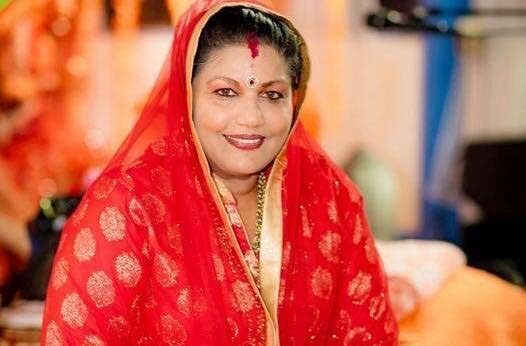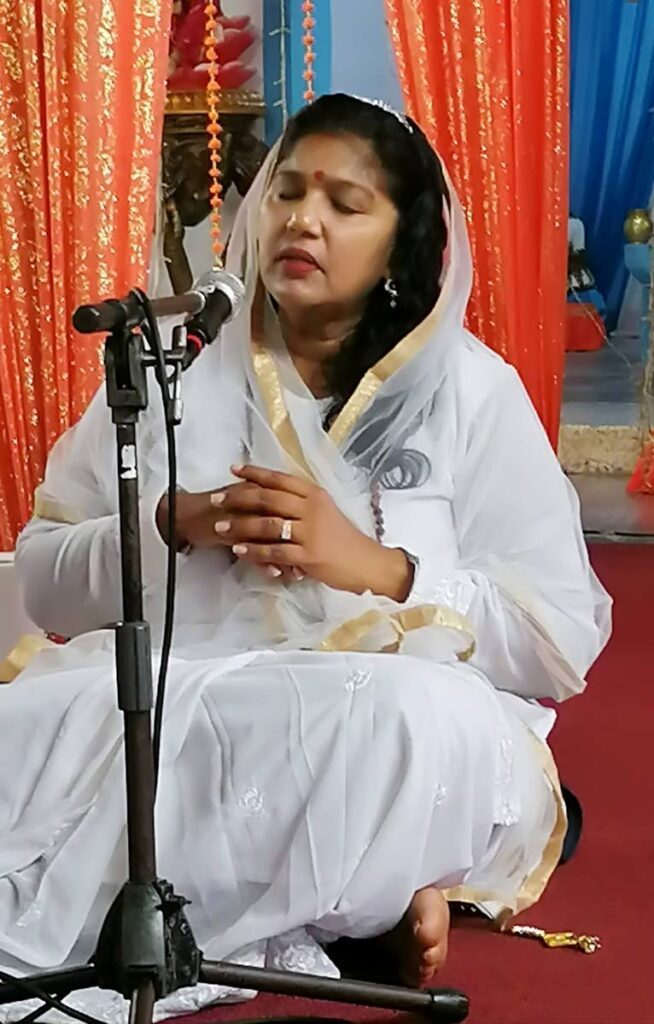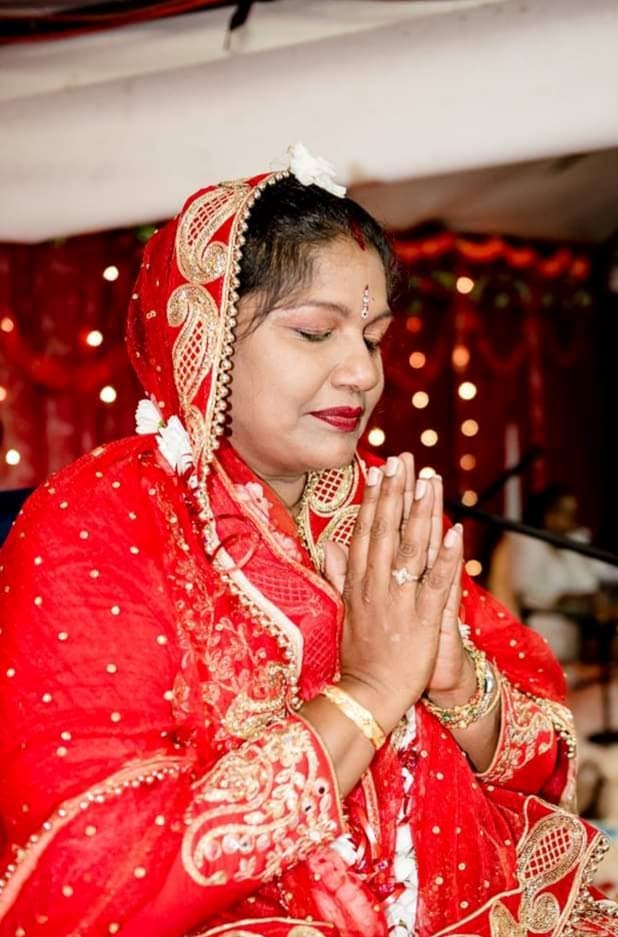Pandita Pamela Gokool maps out non-traditional path for Hindu women

BAVINA SOOKDEO
Pamela Gokool, one of the five female pundits (Hindu priests) in Trinidad and Tobago, is breaking barriers in a deeply traditional, male-dominated spiritual landscape.
As the spiritual leader of the Dow Village Hindu Mandir for over 20 years and the Siewdass Sadhu Temple in the Sea, Waterloo for over 16 years, she challenges the patriarchy and caste-based norms that have historically determined who can serve as pundits.
With her love for Sanatan Dharma (eternal order) and her unwavering belief in women’s ability to lead in religious spaces, Gokool is carving a path for future generations of panditas.
Gokool’s journey into Hindu priesthood began at a young age.
“When I was about three years old, I started attending the Dow Village Hindu Mandir…I grew up there,” she said, recalling how her neighbours would take her to the temple. As a child, she mimicked the rituals of the pundits, often pretending to lead prayers while using leaves and flowers as sacred offerings.
“Whatever I saw the pundits doing in the mandir, I would do with my siblings around me, pretending to be the pundit,” she said with a laugh.
Her deep love for the religion only grew over time, especially as she attended classes in
Ramayan (a sacred text in Hinduism, emphasising heroism and virtue, or dharma) and Hindi, becoming an active part of her temple’s spiritual life.
By the time she was 12, she was already defying cultural expectations, playing in Ramleela, a Hindu theatrical tradition, even though girls were traditionally not allowed to participate. Her persistence led to a pivotal moment when, despite resistance from the elders, she was permitted to play her role – this time dressed as a girl, rather than hiding her gender to participate.

Gokool holds two master’s degrees – one in strategic planning and another in conflict resolution with a focus on alternative dispute resolution. In addition, she has a diploma in paralegal studies.
She told WMN the path to becoming a practising pandita was not without challenges.
“In 1999 is when I really started practising – so for about the past 25 years I have been performing puja. It was rough in the beginning in this male-dominated field,” she admitted.
Gokool faced criticisms from those who told her she was unfit to perform rituals simply because she was not a Brahmin (member of the highest Hindu caste, originally that of the priesthood), and worse, because she was a woman. But she challenged these societal expectations head-on, questioning the logic behind excluding women from such roles.
“A woman can make the parsad (offering), she can leepay the bedi (earthen prayer altar), she could iron the clothes for the pundit, she could cook, she could do everything – the only thing she cannot do is pray?” she questioned.
“I strongly believe that souls have no gender,” she stated.

Her belief in the equality of women in religious practices is unwavering.
“We are strong and independent; we can think for ourselves…
"I believe that women can probably do puja even better than the men – we relate better with our people,” Gokool said, pointing out that women bring a unique tenderness, care, and understanding to spiritual leadership.
“There is a certain amount of passion and love in what we are doing.”
Despite the obstacles, Gokool is optimistic about the future for women in Hinduism. She has already seen changes in the acceptance of panditas, noting that more young women are coming forward to learn and practise. At her own mandir in Dow Village, she ensures that everyone, from children to elders, learns how to practise their dharma.
“Manu-smriti (traditionally the most authoritative of the books of the Hindu code (
Dharma-shastra) in India) says, ‘Everyone must learn their dharma.’ If dharma must be taught to all, then all must be able to practise” she insisted.
For Gokool, being a female priest is not just about performing rituals; it is about empowering other women and ensuring that they too can take their place at the forefront of spiritual leadership.

“We no longer have to stay in the back…
"Time is changing, and Hinduism moves with time. We are not a backward religion,” she said, emphasising the importance of equality in religious practices.
She also highlighted the critical role that women play, both in households and in religious spaces.
“Women, we are creation ourselves. We give birth to the men who say we can’t do this and that.”
Reflecting on her journey and the progress she has seen, Gokool remains hopeful.
“I do not see doom and gloom where women are concerned, especially in the field as practising panditas.”
Through Gokool’s work she continues to inspire women to break free from the limitations imposed by tradition and to embrace their roles as spiritual leaders in their communities.
“It is refreshing for me. It looks very healthy from where I sit. I know as time goes by, we will begin to see equality in all of this. As it is right now, there are a lot of pundits who respect me and honour me as a pandita. They happily would call me to their mandirs and to their homes, they would recognise me wherever I go. I am happy this is happening.”

When asked to share her reflections on Divali and its deeper significance, the pandita described it as a time of profound introspection and transformation.
“Divali signifies good over evil – our goodness inside of us over the evil inside of us. All our good qualities, we must take a good look at it and also examine all bad qualities and, one by one, try to get rid of those negative qualities,” she said.
This practice of goodness, she said, is not solely about religious rituals but extends to everyday virtues.
“Practising good things does not mean puja – it means being kind, understanding, having a willingness to forgive, a willingness to give charity without looking for anything in return – just do good for goodness’ sake. The human nature is supposed to be compassionate and kind, and if we are human beings, we are supposed to act like human beings.”
Gokool emphasised the importance of light over darkness, noting, “All of us have that divine light inside of us, the divine spark of God, but what covers it are the layers of our ignorance which entail our jealousy, our greed, our hatred, our anger, our animosity.”
By focusing on cultivating goodness, she believes individuals can “eliminate those vices and negative qualities inside of us,” allowing the inner light to shine brightly.
She also sees Divali as a time to celebrate “knowledge over ignorance” and the journey of self-discovery.
“The awareness that we are super human beings, that we are divine beings...
"If I equip myself with all these divine qualities, I recognise myself to be a beautiful, divine soul having a human experience in this time,” she explained.
This wisdom, she suggests, brings a responsibility to live meaningfully.
“Do everything to ensure that I have a good human experience…so if by chance I have to come back, I have created enough good karma to enjoy a better human experience next time, hopefully in a good and healthy human body.”
Gokool sent out a powerful reminder of discerning wisdom.
“Knowledge...is supposed to equip me to recognise within everyone their good qualities…and in everyone, there is also some degree of bad qualities…but it is what you see. Take what is good and discard what is bad.” This message of compassion and clarity echoes the essence of Divali as a time to honour both personal and universal growth toward greater wisdom and light.

Comments
"Pandita Pamela Gokool maps out non-traditional path for Hindu women"